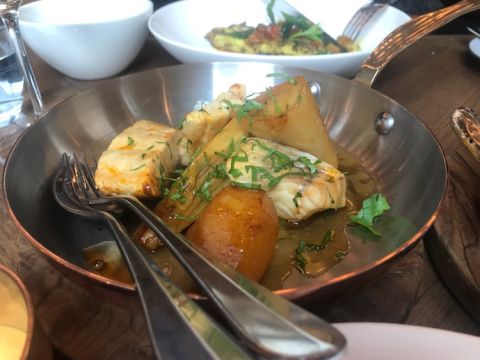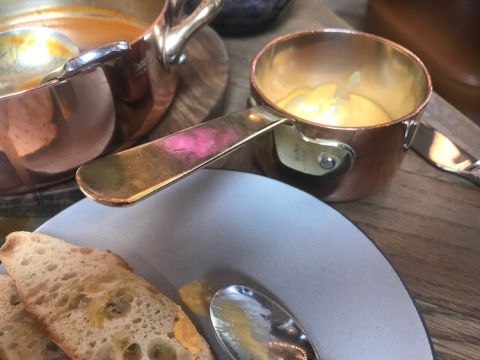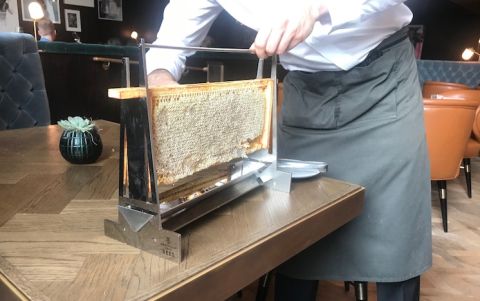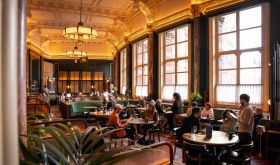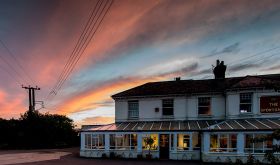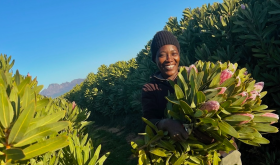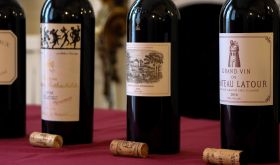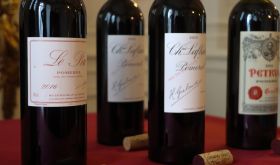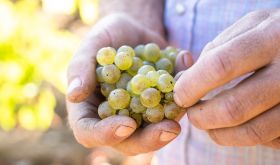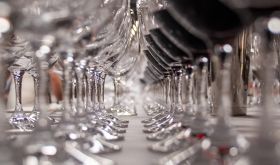I went for lunch and dinner to Wild Honey St James primarily because of a common complaint from readers at the FT Weekend Live event in early September that resonated with me. Why are so many restaurants, particularly the most recently opened ones, so noisy, they wanted to know? I addressed this complaint specifically in 2006 in Why are modern restaurants so noisy?, from which I remembered two fascinating facts.
The first is that it is only the cumulative effect of soft furnishings that will have any effect. Curtains, tablecloths, and felt under the tables and chairs work only when they are all used together; one of these on its own has little effect. Secondly, hearing is a faculty that, like one’s eyesight, wanes with age. But while we all seem prepared to spend a lot of money on our eyewear, few of us are prepared to spend anything like as much on hearing aids. (The complainers at the FT event were all over 50.)
I had long admired the menu of the original Wild Honey, a restaurant that once operated in Mayfair, and even more the culinary approach of its chef, Anthony Demetre.
Demetre, now 52 and seen here with his restaurant manager, has been cooking for the past 30 years ever since an injury forced him to leave his chosen profession, as a pilot in the Fleet Air Arm. Then over 15 years he learnt in the kitchens of Raymond Blanc, Bruno Loubet, Gary Rhodes and Marco Pierre White. By the time he opened Arbutus in London’s Soho in 2006 and then Wild Honey with restaurateur Will Smith, Demetre had developed a particular ‘cross-Channel’ style of his own.
This is based on classic, French culinary skills, which, he observed to me recently with some regret, seem to be on the decline in the capital. But he believes in using the best of British ingredients, all of which are overlaid with the happy memories these dishes engender in him. 'My bouillabaisse is based on the week I spent, aged 39, in the kitchens of Chez Michel in Marseille; my soupe au pistou on the one I can still recall the taste of in Uzès; my short ribs of beef are based on a delicious version of this dish I once ate at Gramercy Park in New York', Demetre recalled with a reflective smile.
But it was his move from his many years as a chef in an independent restaurant into the Sofitel hotel that puzzled me. How had this come about?
‘It was a former Sofitel general manager who used to eat at Wild Honey who first floated the idea as there had been two unsuccessful restaurants here. The room has its challenges: three different entrances and a set of lavatories that are the other side of the hotel lobby, but there are compensations, such as the size and proximity of the kitchen', Demetre explained.
The high-ceilinged restaurant that can accommodate 110, double the restaurant’s previous size, offers not just excellent acoustics, but also the space to show off Demetre’s cooking. His bouillabaisse dish – in fact the four different dishes, including copper pans, shown above containing the fish, the extraordinarily concentrated soup, the tangy rouille, and the thin slices of bread – is a case in point. They just fit on to one of the tables here while I remember how difficult it was to serve them in the much more cramped dimensions of his former restaurants. His dish of rabbit, the saddle roasted and the shoulder served as a cottage pie in a dish on the side, is another beneficiary of this move. So too is his delicious honey ice cream topped with slices of Bermondsey honey hacked by a waiter from a giant vertical honeycomb.
Demetre’s love of cooking with ingredients that he describes as ‘cheap but delicious’ have been tempered by his years in Mayfair but still play a part in his set lunch menu. This will invariably include a rendition of pig’s head; a stunning ribollita, made by Stefano, an Italian member of his brigade; mackerel; and an unusual North African-influenced vegetarian main course of slow-baked aubergine with a slightly over-salted freekeh wheat salad with pomegranate.
This extra space that provides Demetre with a private dining room and the ability to cook a separate menu for the bar behind the restaurant seem to have relaxed this chef. So too has the presence of head chef Simon Woodrow, 30, who has followed Demetre from Arbutus and Wild Honey.
The move also seems to have made Demetre more philosophical. ‘I realise now that what the kitchen produces is no more than 40% of what the customer experiences. The rest is up to the wine list, the restaurant’s atmosphere and, most importantly, the attitude of the waiting staff. I keep on telling them that it doesn’t matter when you drop a plate right in front of the customer. These things happen. What is important is how you react and how you make up for it.’
From our corner table, the restaurant’s location within a hotel is still obvious. But so too was the fact that we could easily hear ourselves speak and think. Demetre’s ambition that the presence of Wild Honey will serve to detract from the formality of the hotel is well under way.
Wild Honey St James 8 Pall Mall, London SW1Y 5NG; tel +44 207 968 2900


